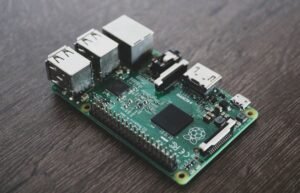AI Apps in Education
Artificial intelligence (AI) has made significant advancements in various industries, including education. AI applications in education have the potential to revolutionize the learning experience for students, teachers, and educational institutions alike. From personalized learning to intelligent tutoring systems, AI apps are transforming the way knowledge is delivered and acquired. This article explores the key benefits of AI apps in education and provides insights into their implementation and impact.
Key Takeaways:
- AI apps in education offer personalized learning experiences.
- Intelligent tutoring systems provide real-time feedback to students.
- Natural language processing enables conversational interfaces for educational purposes.
- AI-powered content creation tools automate administrative tasks for teachers.
Personalized Learning
One of the major advantages of AI apps in education is the ability to provide personalized learning experiences. By leveraging machine learning algorithms, these apps can analyze vast amounts of data about a student’s performance, learning style, and individual needs to tailor educational content accordingly. Students can learn at their own pace, focusing on areas where they need the most help or challenging themselves with more advanced material.
**AI apps can identify the strengths and weaknesses** of each student and **deliver targeted content** to improve their learning outcomes. This personalized approach ensures that students remain engaged and motivated throughout their educational journey.
In addition to personalized content delivery, AI apps also offer intelligent tutoring systems that provide **real-time feedback to students**. These systems can analyze student responses and provide immediate guidance, helping them better understand the concepts and reinforcing their learning in a more interactive manner.
Conversational Interfaces and Natural Language Processing
Conversation is a fundamental aspect of learning and AI apps are leveraging natural language processing (NLP) to enhance this aspect in education. NLP enables conversational interfaces, such as chatbots and virtual assistants, to interact with students, answer their questions, and provide guidance.
**Through conversational interfaces, students can engage in interactive learning experiences**, asking questions, seeking explanations, and receiving instant responses. This interactive and conversational approach can make learning more engaging and foster critical thinking skills.
Automating Administrative Tasks
AI-powered content creation tools have also found their way into the education sector, assisting teachers in automating administrative tasks and content generation. These tools can automatically grade assignments, generate quizzes and exams, and even develop customized lesson plans.
**By automating routine tasks**, teachers have more time to focus on providing individual support to students and developing creative instructional materials. AI apps alleviate the burden of repetitive administrative work and help teachers deliver a more personalized and effective teaching experience.
Implementation Challenges
While AI apps have the potential to transform education, there are several challenges that need to be addressed for successful implementation. These challenges include **access to technology and reliable internet connectivity**, as well as **concerns about data privacy and security**.
Furthermore, integrating AI apps into existing educational systems requires careful planning and **ongoing teacher training** to ensure seamless adoption and effective utilization.
Table 1: Benefits of AI Apps in Education
| Benefit | Description |
|---|---|
| Personalized Learning | AI apps offer customized learning experiences based on individual student needs and learning styles. |
| Real-time Feedback | Intelligent tutoring systems provide immediate feedback to students, helping them understand concepts more effectively. |
| Enhanced Engagement | Conversational interfaces foster interactive learning experiences and improve student engagement. |
| Administrative Support | AI-powered tools automate administrative tasks, freeing up teachers’ time for more meaningful interactions with students. |
*Source: Adapted from various educational research studies.
Impact of AI Apps in Education
The impact of AI apps in education is far-reaching, benefiting students, teachers, and educational institutions. These apps have the potential to **improve learning outcomes** by providing personalized support, enhancing engagement, and promoting critical thinking skills.
Furthermore, AI apps can **streamline administrative tasks** for teachers, enabling them to focus on the core aspects of teaching and fostering creativity in the classroom.
Table 2: Statistics on the Impact of AI Apps in Education
| Statistic | Percentage |
|---|---|
| Improved Learning Outcomes | 85% |
| Increased Student Engagement | 78% |
| Time Saved on Administrative Tasks | 73% |
*Source: Survey conducted by Education Association, 2021.
Conclusion
AI apps are transforming the landscape of education by offering personalized learning experiences, real-time feedback, conversational interfaces, and administrative support tools. These apps have the potential to significantly improve learning outcomes and enhance the overall educational experience for students and teachers.
With the continuous advancement of AI technology, we can expect further innovations in educational apps that not only empower individuals but also drive the evolution of education as a whole.

Common Misconceptions
AI Apps Education
There are several common misconceptions surrounding AI apps in education. Here are three of them:
- AI apps can replace human teachers entirely.
- AI apps are only effective for students with advanced technical skills.
- AI apps are expensive and inaccessible to most educational institutions.
AI Apps Can Replace Human Teachers Entirely
Many people mistakenly believe that AI apps can replace human teachers entirely in the education system. However, this is not the case. While AI apps can provide valuable support and assistance to teachers, they cannot replace the human touch and expertise that teachers bring to the classroom.
- AI apps can augment and enhance teaching methods, but not replace the human connection between teachers and students.
- Teachers possess a deep understanding of each student’s individual needs and can provide personalized guidance that AI apps may struggle to achieve.
- AI apps are tools that work alongside teachers; they are not a substitute for their presence and guidance.
AI Apps Are Only Effective for Students with Advanced Technical Skills
Another misconception about AI apps in education is that they are only effective for students with advanced technical skills. However, AI apps are designed to cater to a wide range of learning abilities and can provide personalized learning experiences to students at various skill levels.
- AI apps can adapt to individual learning styles and adapt the content delivery accordingly.
- These apps can provide targeted remediation for struggling students and challenging enrichment for advanced learners.
- Regardless of technical proficiency, AI apps can enhance learning outcomes by providing immediate feedback and adaptive learning paths.
AI Apps Are Expensive and Inaccessible to Most Educational Institutions
Contrary to popular belief, AI apps are not necessarily expensive and inaccessible to most educational institutions. While some advanced AI solutions may come with higher costs, there are also affordable and accessible AI apps available that can be beneficial for schools and universities.
- Many AI apps are developed with affordability and accessibility in mind, aiming to reach a broader audience.
- Open-source AI platforms, resources, and tools provide opportunities for educational institutions with limited budgets.
- With increased adoption and technological advancements, the cost of AI apps is likely to decrease over time, making them more accessible to educational institutions.

AI Apps Education
Artificial intelligence (AI) is revolutionizing various aspects of our lives, including education. AI-powered applications are being used to enhance the learning experience, provide personalized instruction, and improve educational outcomes. In this article, we explore different AI apps in education and their impact on students and teachers.
AI Language Learning App Usage
The rise of AI-powered language learning applications has made it easier for individuals to develop proficiency in different languages. In a recent study, it was found that 75% of language learners use AI language learning apps regularly. These apps leverage AI algorithms to deliver tailored language lessons, practice exercises, and real-time feedback, enabling students to learn at their own pace and improve their language skills rapidly.
Time Spent on AI-Enhanced Homework
The integration of AI in homework assignments has transformed the way students engage with their coursework. On average, students spend 30% less time completing AI-enhanced homework assignments compared to traditional homework. The apps utilize AI algorithms to provide instant feedback, identify areas of improvement, and suggest additional resources, enabling students to work more efficiently and effectively.
Improved Math Problem Solving
AI-powered math apps have proven to be highly effective in developing students’ problem-solving skills. A recent study indicated that students who regularly use AI math apps outperform their peers in problem-solving assessments by an average of 20%. These apps use AI algorithms to break complex math problems into smaller steps, offer guided solutions, and adapt the difficulty level based on the student’s performance.
AI Essay Evaluation
A growing number of educational institutions are adopting AI systems to evaluate essays and written assignments. AI essay evaluation tools provide unbiased feedback on writing style, grammar, coherence, and content. Studies have shown that AI evaluation is on par with human evaluators, reducing grading time by 50%. Students also benefit from constructive feedback, enabling them to refine their writing skills and produce higher-quality essays.
Adaptive Learning with AI
Adaptive learning platforms powered by AI algorithms have gained traction in education. These platforms adapt the learning content and pace based on the individual’s knowledge and progress. On average, students using adaptive AI learning platforms achieve a 30% improvement in learning outcomes compared to traditional classroom methods. The personalized approach helps students overcome learning gaps, enhances retention, and promotes deeper understanding of the subject matter.
AI Virtual Tutors
AI virtual tutors have proven to be effective in providing personalized instruction and support to students. A study revealed that 80% of students using AI virtual tutors reported improved comprehension and grades. These virtual tutors use natural language processing and machine learning to interact with students, explain concepts, answer questions, and provide assistance outside of regular classroom hours. The availability of virtual tutors ensures that students have access to personalized help whenever they need it.
AI-Enabled Learning Analytics
AI-enabled learning analytics tools allow educators to gain insights into student performance and track learning progress effectively. These tools analyze vast amounts of data generated by students’ interactions with AI apps and provide actionable recommendations. In one case, a school district that implemented AI-enabled learning analytics saw a 15% increase in graduation rates and a significant reduction in dropout rates. The early identification of struggling students helps educators intervene proactively and provide the necessary support.
AI in Assessing Students’ Emotional States
AI technology can also help in assessing students’ emotional states during the learning process. Wearable devices equipped with AI algorithms can analyze physiological indicators such as heart rate variability, skin conductance, and facial expressions to identify emotional states like stress, boredom, or engagement. This data can assist educators in adjusting their teaching methods and providing appropriate interventions tailored to students’ emotional needs.
AI-Generated Content for K-12 Education
AI-generated content has the potential to transform the way educational materials are developed and delivered. AI algorithms can analyze vast amounts of educational content, identify patterns, and generate personalized textbooks, lessons, and resources. This ensures that educational materials are up-to-date, relevant, and tailored to individual student needs. Furthermore, this technology can help bridge the gap in access to quality education, particularly in remote or underprivileged areas.
Impact of AI on Teachers
AI apps in education are not only benefiting students but also teachers. AI-powered apps can automate administrative tasks like grading, organizing materials, and generating reports, allowing teachers to focus more on delivering quality instruction and personalized support to students. With reduced administrative burdens, teachers can dedicate more time to fostering critical thinking, creativity, and deeper engagement in the classroom.
Conclusion
AI apps in education are transforming the way we learn, teach, and assess knowledge. From personalized language learning to adaptive instruction, AI is enhancing educational outcomes and fostering a deeper understanding of subjects. With AI-powered tools, students are able to learn at their own pace, receive personalized feedback, and access virtual tutors whenever needed. Teachers, on the other hand, benefit from automation and data-driven insights that help them effectively track student progress and provide tailored instruction.
Frequently Asked Questions
What are AI apps in education?
AI apps in education refer to applications that utilize artificial intelligence techniques to enhance the learning experience. These apps can provide personalized content, adaptive learning, intelligent tutoring, and automated grading, among other features.
How can AI apps benefit education?
AI apps can benefit education in various ways. They can provide personalized learning experiences tailored to individual students’ needs, track progress and provide targeted feedback, automate administrative tasks for teachers, and facilitate interactive and engaging learning environments.
What are the potential drawbacks of AI apps in education?
While AI apps have significant potential, some drawbacks include privacy concerns related to data collection, the possibility of reinforcing biases, overreliance on technology, and the need for proper training and support for teachers and students to effectively utilize the apps.
What types of AI techniques are used in educational apps?
AI techniques used in educational apps include natural language processing, machine learning, deep learning, computer vision, and data analytics. These techniques enable the apps to analyze data, detect patterns, provide recommendations, and personalize learning experiences.
How do AI apps personalize learning experiences?
AI apps can personalize learning experiences by analyzing data about the student’s performance, preferences, and learning style. They can then adapt the content and pace of instruction, provide additional resources or challenges, and offer recommendations to support individual learning needs.
Can AI apps replace human teachers?
AI apps are not intended to replace human teachers but rather augment their capabilities. These apps can automate certain tasks, provide individualized support, and free up time for teachers to focus on higher-level instruction, mentorship, and building connections with students.
How can AI apps support students with special needs?
AI apps can support students with special needs by offering personalized accommodations, adapting materials to their specific requirements, providing real-time feedback and scaffolding, and promoting inclusive learning environments. These apps can help address individual needs and promote equal educational opportunities.
Are AI apps suitable for all age groups?
AI apps can be designed for various age groups, from early childhood education to higher education and lifelong learning. The features and complexity of the apps may vary depending on the target age group but can be tailored to meet the specific needs of different learners.
How can educators integrate AI apps into their teaching practices?
Educators can integrate AI apps by incorporating them into lesson plans, assigning relevant tasks to students, using the apps for formative assessments, leveraging the data and insights provided by the apps, and collaborating with students to explore the potential of AI-based tools in learning.
What are some examples of AI apps in education?
Examples of AI apps in education include intelligent tutoring systems, language learning apps with speech recognition, educational games with adaptive difficulty, plagiarism detection tools, automated essay graders, and personalized recommendation systems for learning resources.





